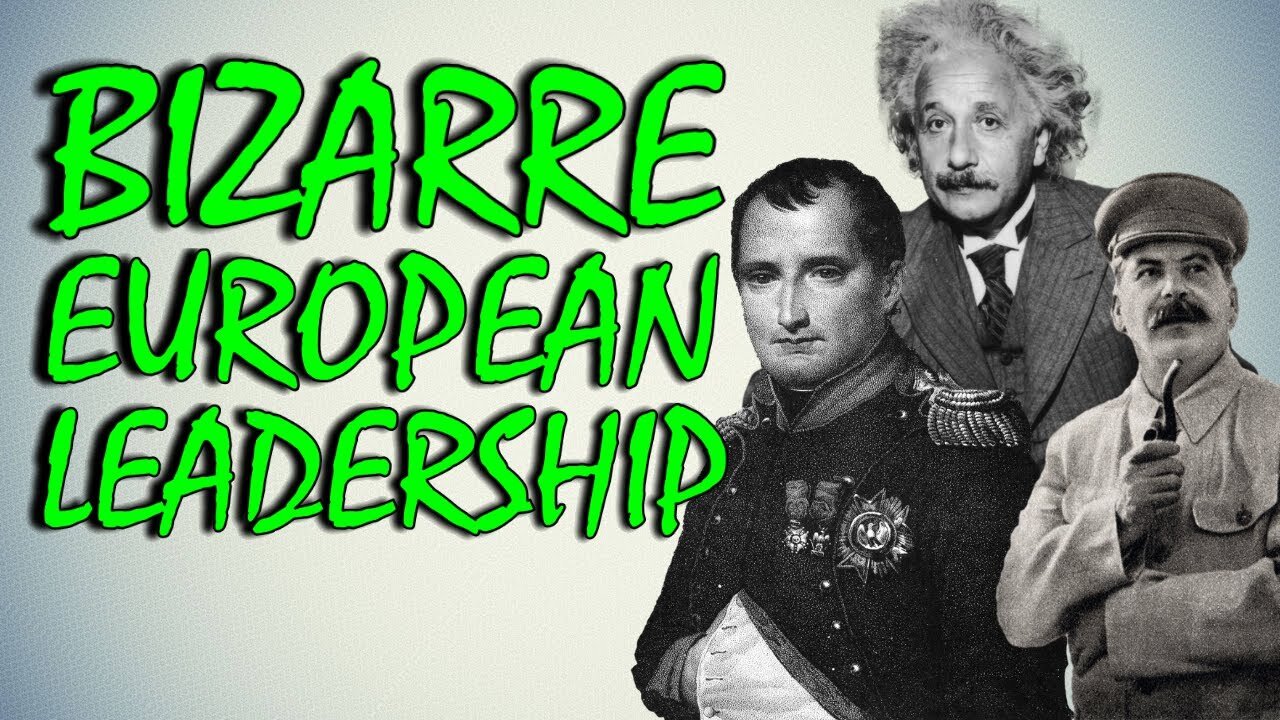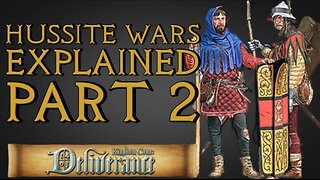Premium Only Content

Strangest Stories of Famous European Leaders - Bizarre History
Joseph Vissarionovich Stalin (born Ioseb Besarionis dzе Jughashvili, 18 December [O.S. 6 December] 1878 – 5 March 1953) was a Georgian revolutionary and Soviet politician who ruled the Soviet Union from the mid-1920s until his death in 1953. During his years in power, he served as both General Secretary of the Communist Party of the Soviet Union (1922–1952) and Chairman of the Council of Ministers of the Soviet Union (1941–1953). Despite initially governing the country as part of a collective leadership, he ultimately consolidated power to become the Soviet Union's de facto dictator by the 1930s. A communist ideologically committed to the Leninist interpretation of Marxism, Stalin formalised these ideas as Marxism–Leninism while his own policies are known as Stalinism.
Napoléon Bonaparte (/nəˈpoʊliən, -ˈpoʊljən/; French: [napɔleɔ̃ bɔnapaʁt], born Napoleone, Italian: [napoleˈoːne]; 15 August 1769 – 5 May 1821) was a French military and political leader who rose to prominence during the French Revolution and led several successful campaigns during the Revolutionary Wars. As Napoleon I, he was Emperor of the French from 1804 until 1814, and again in 1815. Napoleon dominated European and global affairs for more than a decade while leading France against a series of coalitions in the Napoleonic Wars. He won most of these wars and the vast majority of his battles, building a large empire that ruled over continental Europe before its final collapse in 1815. One of the greatest commanders in history, his wars and campaigns are studied at military schools worldwide. He also remains one of the most celebrated and controversial political figures in history. Napoleon had an extensive and powerful impact on the modern world, bringing liberal reforms to the numerous territories that he conquered and controlled, especially the Low Countries, Switzerland, and large parts of modern Italy and Germany. He implemented fundamental liberal policies in France and throughout Western Europe. His lasting legal achievement, the Napoleonic Code, has been highly influential. Roberts says, "The ideas that underpin our modern world—meritocracy, equality before the law, property rights, religious toleration, modern secular education, sound finances, and so on—were championed, consolidated, codified and geographically extended by Napoleon. To them he added a rational and efficient local administration, an end to rural banditry, the encouragement of science and the arts, the abolition of feudalism and the greatest codification of laws since the fall of the Roman Empire."
Albert Einstein (/ˈaɪnstaɪn/ EYEN-styne; German: [ˈalbɛʁt ˈʔaɪnʃtaɪn] (About this soundlisten); 14 March 1879 – 18 April 1955) was a German-born theoretical physicist who developed the theory of relativity, one of the two pillars of modern physics (alongside quantum mechanics). His work is also known for its influence on the philosophy of science. He is best known to the general public for his mass–energy equivalence formula E = mc2, which has been dubbed "the world's most famous equation". He received the 1921 Nobel Prize in Physics "for his services to theoretical physics, and especially for his discovery of the law of the photoelectric effect", a pivotal step in the development of quantum theory.
#BizarreHistory #StrangeHistory #WeirdHistory
-
 12:35
12:35
Parry This
1 year agoThe Hussite Civil War Explained - Medieval Bohemian History
59 -
 7:34:25
7:34:25
Dr Disrespect
17 hours ago🔴LIVE - DR DISRESPECT - WARZONE - IMPOSSIBLE TRIPLE THREAT CHALLENGE
196K27 -
 1:02:45
1:02:45
Tundra Tactical
7 hours ago $19.79 earned🛑 KASH PATEL NEW ATF DIRECTOR??? Breaking News!!!! 🛑
57.4K7 -
 4:31:10
4:31:10
I_Came_With_Fire_Podcast
17 hours agoMy EURO Divorce | HOGG with a side of PAC | Foreign FUNDS Fudged
34K2 -
 37:44
37:44
Glenn Greenwald
14 hours agoGlenn On Tearing Down the Military Industrial Complex, Exposing Pro-Israel Indoctrination, and More | SYSTEM UPDATE #411
110K121 -
 4:04:20
4:04:20
Nerdrotic
13 hours ago $51.23 earnedAmazon Takes 007! Hollywood is Lost, Disney Cancels WHO? | Friday Night Tights 342 /w ItsAGundam
171K40 -
 43:27
43:27
Tucker Carlson
12 hours agoRay Dalio: America’s Hidden Civil War, and the Race to Beat China in Tech, Economics, and Academia
165K189 -
 56:56
56:56
Candace Show Podcast
13 hours agoEXCLUSIVE: Taylor Swift Will Be Deposed. | Candace Ep 150
197K164 -
 1:03:52
1:03:52
IsaacButterfield
9 hours ago $6.33 earnedRepublican Vs 25 Transgender Activists | Jewish Outrage | Lizzo Loses All the Weight
60.5K14 -
 1:10:23
1:10:23
Edge of Wonder
13 hours agoChinese Biochips Hacking Minds? Quantum Control & Journey Song Mandela Effect
82.7K9